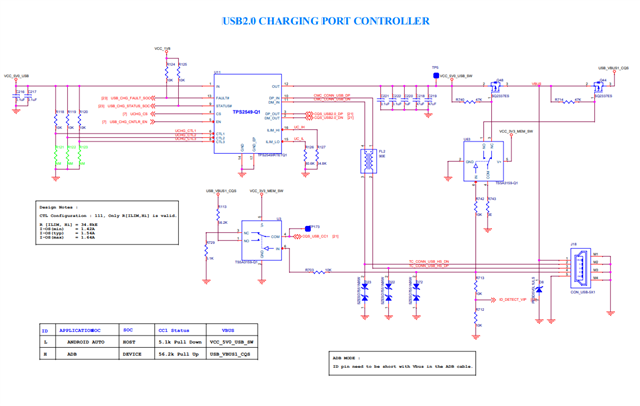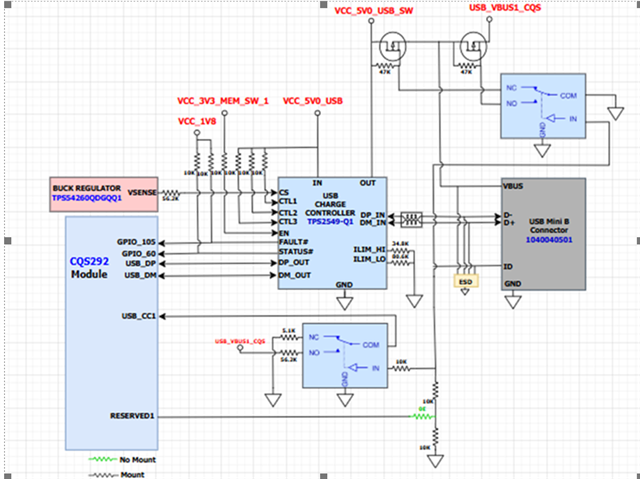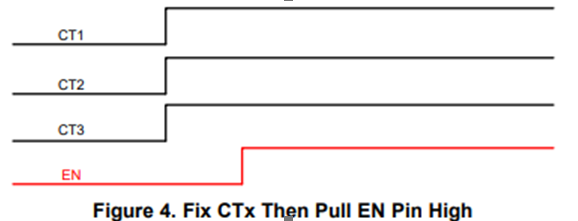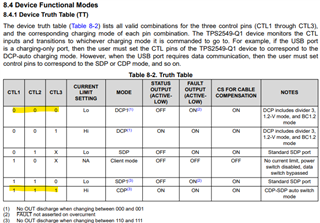Other Parts Discussed in Thread: TPS2549,
Tool/software:
Could you please help me for schematic review for customer of TPS2549

This thread has been locked.
If you have a related question, please click the "Ask a related question" button in the top right corner. The newly created question will be automatically linked to this question.
Tool/software:
Could you please help me for schematic review for customer of TPS2549

Please allow some time for schematics reviews.
Thanks!
Hi Kunal,
TPS2549-Q1 circuit looks acceptable. I confirmed the current limit resistor matches the calculated values.
I'm not too familiar with the USB ID pin. It appears if ID is low, the SOC's (I think) CC pin will get exposed to 5.1k, telling it to act as host. TPS2549-Q1 will supply up to 1.5A via VCC_5V0_USB_SW net. If ID is high, SOC's CC pin (again, guessing here) is exposed to 56.2k pullup, indicating SOC is USB device and the systems can consume up to 900mA, which is consumed via VBUS1_CQS net.
All of this sounds fine. My only concern is I don't understand how the ID pin behaves. Is it something that can change during an active connection? I'm a little concerned about the timing of the ID pin switching and what will happen if TPS2549-Q1 is set to CDP mode (CTL = 111) and ID is high.
Regards,
Eric
Hi Eric,
PFB comment from customer:
-> Our end product is always in a Host mode. During development we need to make a product in device mode for that we use this logic also we use customized cable to achieve that.
I need your urgent help for below customer query.
This is just an overview of the schematics, which I have attached.

Query 1 :
Need to confirm that the CDP to SDP logic looks fine or not!!!
Query 2 :
Need to confirm the timing sequence for this CT pin and EN pin is fine, or needs to be verified based on our design
What will happen if the sequence is different?

Thanks & Regards,
Kunal Dhawan
+91-8683809714
Hi Kunal,
The device as shown will act in CDP-SDP auto switch mode. This effectively means it will act as CDP.
If EN pin goes high while the CTL pins are still low, the device will first handshake as DCP and abide by ILIM_LO, per datasheet truth table 8-2. TPS2549-Q1 actively monitors the CTL pins, so when they go high, it will restart the bus and handshake in CDP-SDP auto switch mode.
If EN comes up after CTL pins are high, it guarantees the first handshake will be from CDP-SDP auto switch mode.
Regards,
Eric

Hi Eric,
Customer has below doubts:
We have a few doubts.:
Also, as per our design,
Test Plan: We are looking for the test plan to confirm that this controller, operating based on our requirements.
Thanks & Regards,
Kunal Dhawan
Hi Kunal,
Our requirement is 12W (5V - 2.4A)
This is not possible with BC1.2 alone. There are 3 types of ports defined by BC1.2
The only way to get 2.4A is with 2.7V/Divider 3 mode, which by definition does not support USB data. It is similar to DCP. TPS2549-Q1 uses Divider3 mode when configured as DCP.
DCP/Divider 3 and USB2.0 data are mutually exclusive. You can't have both.
Constraint: SDP mode can only source 500mA, our use case is 2.4A, it needs to be sourced
The device only enters SDP mode when a phone connects and doesn't comply with BC1.2. Please review datasheet section 8.3.6 for details.
Regards,
Eric